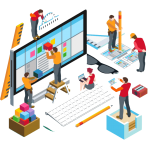What is content management system (cms)?
A content management system (CMS) is a software application or platform that allows individuals or organizations to create, manage, and publish digital content on the web without requiring advanced technical skills. A content management system provides a user-friendly interface enables users to easily add, edit, and organise content
The key components and features of a CMS typically include:
- Content Creation and Editing: CMSs provide a text editor or WYSIWYG (What You See Is What You Get) interface. It allows users to create and edit content directly within the system. Users can format text, add images and media, and apply styling without needing to write code.
- Content Organisation and Management: CMSs offer tools to organise and categorise content into logical structures. This allows for easy navigation and retrieval of content within the website.
- User Management and Permissions: CMSs enable administrators to manage user accounts and assign different roles and permissions. This allows for collaborative content creation, with multiple users contributing and editing content based on their assigned privileges.
- Templates and Themes: CMSs often provide pre-designed templates or themes. Users can select and customize these templates to create a visually appealing and consistent design.
- Extensibility and Plugins: CMSs often support plugins or extensions that provide additional functionality and features. These can include SEO optimization, e-commerce capabilities, contact forms, social media integration, and more.
- Version Control and Workflow: Some CMSs offer version control features, allowing users to track changes made to content and revert to previous versions if needed.
Popular examples of CMSs include WordPress, Drupal, Joomla. These systems offer varying levels of complexity and customisation options, catering to different user needs and website requirements.
CMSs simplify the process of website management, enabling users to focus on content creation without any advance technical skills. They are widely used by individuals, small businesses, and large enterprises to create and maintain websites, blogs, e-commerce platforms, and other digital content-driven solutions.



